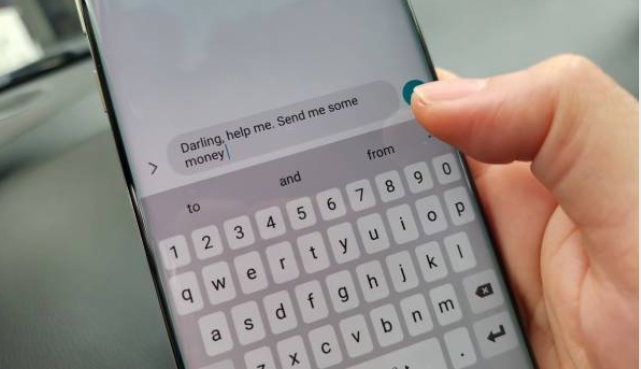In a world where technology connects hearts across continents, it’s unfortunate that some individuals exploit this connectivity for their personal gain.
National Inquiry Agency has investigated numerous romantic scams, a heartbreaking phenomenon that preys on vulnerability and trust, which have become increasingly prevalent in our digital age, especially since the explosion of social media and encrypted messaging apps like WhatsApp.
As we seek love and companionship online, it’s crucial to arm ourselves with knowledge to recognize and protect against these deceitful schemes. We are now in an age where scammers utilise an array of different online websites and apps to reel in prey.
Scammers may weaponise encrypted messaging platforms, instant messaging platforms like Snap Chat where pictures and messages are only available for a short period of time before they become inaccessible, as well as the ability of scammers to steal identities through duplicating Instagram and Facebook profiles. The National Inquiry Agency has assisted many of their clients to debunk a lot of these scams
The Allure of Online Romance
The internet has revolutionized how we meet people and form relationships. Online platforms offer a plethora of opportunities to connect with potential partners, regardless of geographical boundaries, giving rise to romantic scams.
Social media platforms like Facebook allow certain types of people, usually the Single and middle-aged, to flock to certain Community Pages to talk and discuss topics of interest. Scammers make recently created profiles (a red flag) with an attractive person seated as their profile picture.
They allure unsuspecting victims by commenting on posts, engaging in discussion, and sending them personal messages. They then continue the conversation privately on the Community Page for a while and then invite them to change platforms, usually Whatsapp or Google Meet.
Once the scammer has reeled in prey, they take advantage of their desire for love and companionship, creating intricate personas to manipulate and exploit their victims emotionally and financially.
Sometimes, millions of dollars are lost in a romance scam.
How to Spot the Red Flags of a Scammer
There are a variety of scammers that use different tactics to get what they want from victims. In order to know whether you are a victim of a scam, it’s best to watch out for the following red flags:
1. It’s Too Good to Be True:
Scammers often present themselves as perfect partners – incredibly attractive, successful, and attentive to the victim’s needs. They sent hundreds of messages filled with emotive words, praise, and seductiveness to their victims.
They mirror their victims’ interests and desires, creating an idealized image that seems too good to be true. They talk of the future, which aligns with their victim in a short period of time.
2. Unrealistic Speed:
Genuine relationships take time to develop. Be cautious if someone declares their undying love and commitment after just a few interactions. Especially if there has yet to be any contact established by telephone or face-to-face.
3. Emergency Situations:
Scammers frequently manufacture urgent situations that require financial assistance, such as medical emergencies or unexpected travel expenses. They are filled with drama and excuses.
These types of sagas prey on the victim’s empathy to assist their love interest emotionally and potentially financially.
4. Avoidance of Video Calls:
If your online connection consistently avoids video calls or in-person meetings, it’s a major warning sign. They might be hiding their true identity or using fake photos.
They also attempt to get the victim desperate to have these interactions by asking for funds to make it possible. They would ask for funds for plane tickets passports, or to cover medical expenses that don’t exist.
5. Asking for Money:
This is the ultimate goal of most romantic scammers. They may concoct elaborate stories to justify requesting financial help. Never send money to someone you’ve only met online, no matter how convincing their story seems.
People hesitate to lend people money in real life, don’t be a sucker for handing it over to an online personality.
How to Avoid These People?
Stay Cautious: Approach online relationships with a healthy dose of skepticism, especially if things escalate quickly. Take your time to get to know the person and validate their identity. Ask for the telephone calls to hear their voice. Ask for video chats. Ask to meet in a public place.
Research: Use reverse image searches to verify the authenticity of photos. Also, research the person’s name and details online to check for inconsistencies. Hire a private investigator to assist with your research if you have doubts.
Protect Personal Information: Never share sensitive information like your home address, financial details, or personal identification numbers with someone you’ve only met online. Never share whether you have inherited money, got a pay rise, have a home, or show wealth indicators.
As harsh of a reminder, this is that scammers exist; true love is out there, but protecting our hearts and minds from those who seek to exploit our vulnerability for capital gain is essential.
Case Study
A gentleman approached us at National Inquiry Agency to run a background check on a female friend he was interested in and met online. He started feeling doubtful after he realised he had never met his person and had invested funds with this lady he had never met.
She had a Facebook account that showed an attractive Asian persona, wearing major fashion brands, and was based in Sydney. He added her as a “Friend” after a ‘Friend Request’ was sent to him randomly. They started chatting online via Facebook Messenger, and then she requested they swap to Whatsapp. He believed her to be authentic. She would send online voice messages to him through Whatsapp and images of what she was up to, however, she had never spoken to him face-to-face through Whatsapp’s Facetime due to being “busy”. She seemed to live a lavish lifestyle and had it all.
He came to me when he had invested $30,000 into an online Bitcoin trading app, and she told him where she had made her money. Now, the “admin” on this Bitcoin trading platform was demanding additional funds for tax purposes and pressuring him to pay.
Again, all the admin support for this online platform was through Whatsapp. The Client was at a loss for words. He felt he had to pay the tax, as the online platform appeared like he had made profits.
Background intel on the online platform and the “persona” indicated that it was the stolen identity of a real woman who existed in Sydney. We then traced the distribution of the Bitcoin that was deposited by our client, which was distributed to multiple wallets that went back to China.
Further analysis revealed that the Bitcoin platform had been red-flagged as a scam site and was a part of a Pig Butchering Scam originating from China.
After knowing this, he shut down and deleted the online Bitcoin trading app and told his romantic interest to stop messaging. After no more funds were received for a while, the scam had ended.
Our client was scorned by the event but was grateful not to have invested more funds for “Tax.”
If you, a relative, or a friend may be a victim of a romance scam, please reach out to one of our investigators today at National Inquiry Agency.




